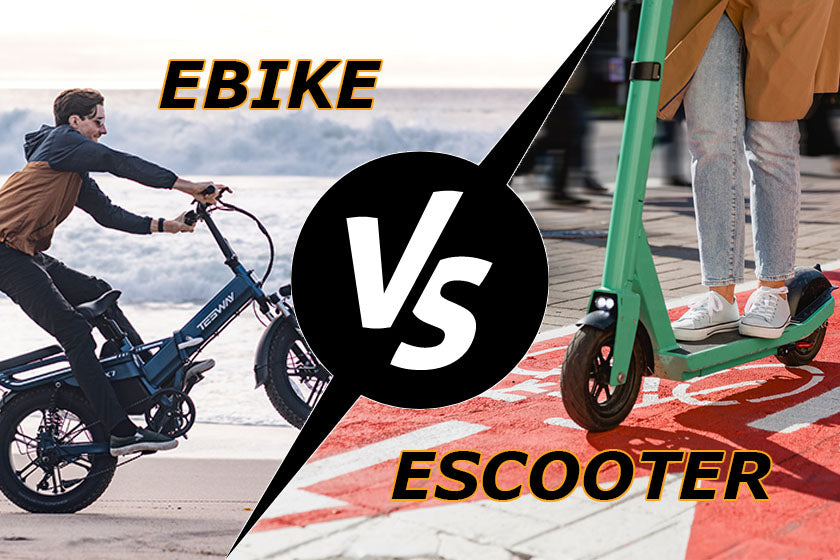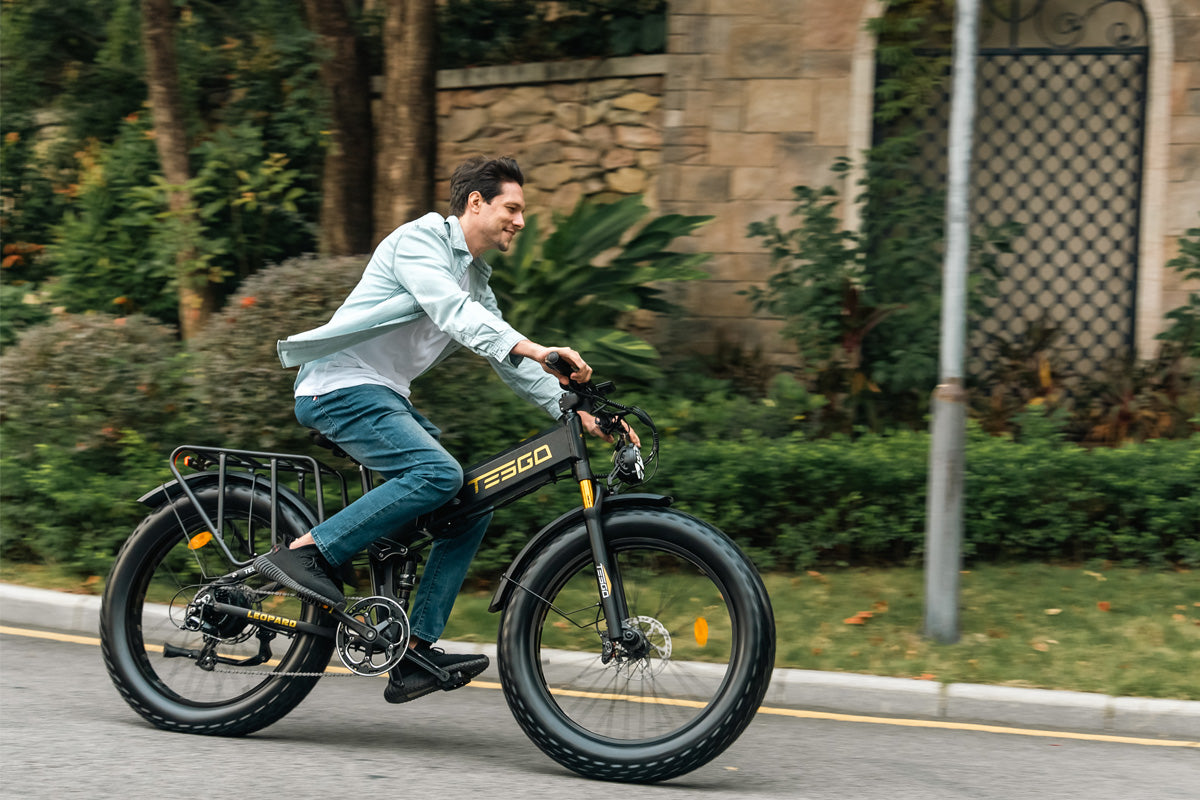
Best Electric Bike for Sales in US: Easy Green Commuting
Reducing carbon emissions and advancing society toward a better future depends on the use of eco-friendly transportation methods, such as e-bikes. Electric bikes offer the added benefit of an electric motor while maintaining the efficiency and mobility of a standard bicycle. E-bikes are powered by rechargeable batteries and enable a wide range of users to cycle easily and conveniently. When in use, electric motorcycles emit no pollutants, reducing carbon emissions and reducing global warming. They can also go through traffic more quickly and occupy less space on the road, which relieves traffic congestion in major cities. By offering improved health and well-being, time and money savings, and convenience, e-bikes encourage an active lifestyle and combat sedentary tendencies. Additionally, they fill in any gaps in transit and lessen the demand for personal vehicles for short excursions by offering last-mile connectivity to bus stops. By promoting electric bikes and developing laws, regulations, and infrastructure that promote biking, we can build communities that are more environmentally friendly, healthier, and sustainable. If we cooperate, we can enhance the planet and provide a better future for coming generations.
The Need for Sustainable Transportation: Easy Green Commuting
Because conventional modes of transportation are detrimental to the environment, the general public's health, and the quality of life, modern society needs eco-friendly modes of transportation.
- Knowing How Traditional Transportation Affects the Environment: Traditional transportation employs fossil fuels, which contribute to air pollution and greenhouse gas emissions. In addition to air pollution and extreme weather, these emissions also contribute to climate change and global warming.
- Addressing Climate Change and Air Pollution: Climate change puts the planet and future generations in grave danger. Ecologically responsible modes of transportation, such as electric bikes, can significantly reduce the harm that climate change causes to ecosystems and societies. By moving to ecologically friendly transportation, we can improve public health and air quality.
- To achieve the goals of sustainable development in green commuting, sustainable mobility encourages energy efficiency, protects natural resources, and preserves biodiversity. By lowering fossil fuel consumption, preserving energy from renewable sources, and preserving energy, electric bikes encourage living sustainably.
This plan reduces carbon emissions, improves air quality, and encourages sustainable development by embracing eco-friendly options like electric bikes. The necessity of sustainable transportation is essential for protecting the environment, public health, and a secure future for future generations. By offering a variety of electric bikes with powerful motors for you to choose from, we support the promotion of sustainable mobility. You may be wondering why an electric bike is necessary in the US. Read our post about 5 reasons to buy an e-bike.
Introducing Electric Bikes
Before getting your best electric bikes for sale from the menu above, be aware that electric bikes revolutionize mobility by providing innovative, cutting-edge, and environmentally sustainable alternatives to traditional bicycles, i.e. by fusing conventional components with cutting-edge electric technology.
- Analyzing the Concept of Electric Bikes: Electric bikes, which provide more power and facilitate pedaling, are just bicycles with an electric motor and rechargeable battery. They must assist in pedaling and human effort to make riding safe, comfortable, and effective.
- How Electric Bikes Differ from Regular Bicycles: Although electric bikes initially appear to be exactly like conventional bicycles, some significant modifications enhance the riding experience.
- E-bikes have an electric assist element that sets them apart from regular bicycles. The motor makes riding comfortable and customized by increasing force and helping the user pedal. Batteries that can be recharged and have a variety of power outputs power the motor.
- Control and display: The handlebars of electric bikes typically incorporate a control panel that allows users to utilize speedometers, odometers, and navigation systems, check battery life, adjust assistance settings, and access other capabilities.
- Weight and Design: Since the battery and electric motor are integrated into the frame, e-bikes often weigh a little bit more than regular bicycles. Thanks to technology breakthroughs that have produced lighter, more streamlined designs, a smooth, nimble ride is now achievable.
- Understanding Electric Assist Technology: The riding experience is improved and e-bikes stand out thanks to the electric assist technology. By exerting extra energy as the cyclist pedals, the electric motor helps them in several ways. E-bikes with pedal-assist systems allow riders to alter power settings and riding surfaces by igniting the engine when the pedals are depressed. Throttle systems enable motor activation without the need for pedaling, providing you with rapid power assistance.
These electric assist systems increase bicycle accessibility and promote eco-friendly, green transportation options by enabling greater distances and challenging terrain. There can be regional limitations and regulations.
Due to their environmentally favorable features, electric bikes offer morally responsible, sustainable transportation. Traveling without stress and responsibly is simple.
- Zero Emissions: Because electric bikes have zero emissions, they help the environment by lowering greenhouse gas and carbon dioxide emissions. Unlike traditional vehicles, electric bikes don't produce any exhaust emissions, thus they help the environment.
- Energy Efficient: Electric bikes consume a great deal less energy than cars with internal combustion engines because of their high energy efficiency. By transforming a sizable portion of battery electricity into mechanical power, they decrease energy consumption and the need for fossil fuels. This has the effect of reducing overall energy use and dependence on fossil fuels.
- Noise reduction: Compared to cars with internal combustion engines, electric bikes are a quieter mode of transportation, reducing noise pollution and promoting peaceful environments. Both parties gain from the absence of engine noise, including the riders and those nearby.
- Lessened Congestion: Electric bikes contribute to a reduction in traffic congestion in urban areas by reducing the number of cars and congestion. Riders' superior agility and smaller footprint than cars let them navigate crowded areas more swiftly and free up road space for short- to medium-distance excursions.
- Less Reliance on Cars: Electric bikes provide an environmentally friendly substitute for driving for short-distance commuting and errands, reducing traffic congestion and pollution. Regularly using an e-bike for errands, work, or grocery shopping promotes green mobility and lowers carbon emissions worldwide.
- Lifecycle Considerations: Compared to traditional vehicles, electric bikes have a lower overall environmental effect during their entire lives.
Choosing electric bikes as a sustainable transportation option promotes environmental preservation by producing zero emissions, being energy-efficient, reducing noise, decreasing congestion, and decreasing reliance on cars. This fosters a cleaner, healthier future.

E-bikes are a great way to improve sustainable mobility and change travel habits. They offer an environmentally friendly transportation option for daily commuting.
- Benefits for Daily Commutes: For environmentally conscious individuals, electric bikes offer a great alternative for regular transportation with a host of advantages.
Riding an e-bike can improve your overall health and fitness. These bikes offer many benefits, including faster commutes, lower costs, and low-impact exercises. Comparatively, e-bikes are more affordable than gasoline-powered cars or using public transportation because they eliminate the need for parking and avoid traffic congestion. Moreover, e-bikes are eco-friendly and produce zero pollutants, which helps improve air quality and reduce the impact of climate change. Overall, commuting on an e-bike is practical and environmentally friendly.
- Enhancing Last-Mile Connectivity: Electric bikes are great for the last mile of a commute, which is the short distance between transit and your final destination. They're practical and effective for these brief trips.
- Ecologically friendly work commutes: E-bikes offer many benefits to employees, including increased productivity, better well-being, and reduced stress levels. Encouraging their use can also benefit the environment by reducing traffic and promoting green practices.
- Promoting Active Lifestyles: Electric bikes are an excellent way to stay active while also assisting with daily travel. They are an ideal mode of transportation for those with physical limitations who want to stay fit and healthy. They are perfect for leisurely rides and outdoor activities, promoting exploration and recreation. Additionally, electric bikes are environmentally friendly, cost-effective, and can help increase connectivity and promote worker wellbeing. Did you know that we offer the best electric bikes for sale in the US? We have a wide range of satisfied customers who have already made the switch.
To ensure safe and environmentally friendly transportation, it is important to consider factors such as safety, legislation, and environmental impact when integrating e-bikes. This requires proper infrastructure and policies to be in place.
- Bike-Friendly Infrastructure: Cities and municipalities can promote safe cycling and increase e-bike usage by investing in bike-friendly facilities like designated bicycle paths, multimodal connections, and cycle-friendly traffic lights. These improvements would encourage more people to choose cycling as a mode of transportation while ensuring their safety on the road.
Safety is key for cyclists, pedestrians, and drivers. Using e-bikes with public transport and bike-sharing programs can encourage longer trips. Synchronized traffic lights can help prioritize bikes and reduce conflicts.
- Charging Infrastructure: Easy access to charging stations is essential for e-bikes, and they are commonly found in prominent locations like shopping centers and transit hubs. These stations provide regular electrical outlets or specific connectors for charging. Riders can also use battery swapping systems to replace dead batteries with fully charged ones, which saves time and allows for longer rides without worrying about the battery's life.
- Promoting E-Bike Adoption: Governments can encourage the use of e-bikes by providing financial incentives, addressing insurance and liability concerns, and creating regulatory structures. Offering financial incentives can make e-bikes more affordable, leading to increased usage. Insurance coverage should also be available to protect riders in case of accidents or theft. Regulatory frameworks can establish clear rules and standards for e-bike use, promoting safety and responsible operation and preventing conflicts between e-bike users, pedestrians, and drivers.
- Education and Awareness: It is crucial for the smooth integration of e-bikes into transportation systems that the general population understands how to use and behave around them. Programs for education, the exchange of best practices among communities and organizations, and instructing riders in safe riding habits are among the initiatives. We can promote safe riding habits, environmentally responsible transportation, and a greener, healthier future through these steps. We may also support bike-friendly laws, regulations, and awareness campaigns.
Overcoming Challenges and Misconceptions
Even while electric bikes, often known as "e-bikes," are becoming more and more popular and have some advantages, there are still problems and myths that need to be dispelled. By addressing prevalent e-bike myths and worries, you may encourage the usage of e-bikes and improve sustainable mobility.
- Safety Issues: E-bike safety is a problem that affects both riders and other road users. Riders using e-bikes must be aware of traffic laws, signaling, and safe riding techniques. A thorough educational effort can encourage understanding, wearing bright apparel, and using the right lighting. Sharing the road and promoting safety among drivers, cyclists, and pedestrians promote calmer behavior on the roadways and safer interactions.
- Range Anxiety: it means the worry that the battery will run out while riding an e-bike. Getting over this fear can boost riders' confidence and motivate them to go on longer rides.
More durable, long-lasting batteries, made possible by advancements in battery technology, lower riders' expectations, and concerns about power outages. While user-friendly battery range displays let riders keep track of their levels, modify their journey plans, and make informed decisions, networking charging stations provide convenient access to frequent recharging options.
- Fostering societal Acceptance: The usage of e-bikes is stigmatized by society and the subject of misconceptions in some places because it is still relatively new. We can change how the general public perceives us by dispelling myths, encouraging fruitful debate, and creating more awareness, advocacy, and community involvement. By exposing various riders and fostering an e-bike culture, stereotypes might be busted, environmentally friendly transportation might be promoted, and a supportive community might be developed.
Electric bikes' role in creating sustainable cities
Cities all across the world are working hard to develop more ecologically friendly regulations that will enhance the quality of life for their citizens. Electric bikes also referred to as e-bikes, have become a key tool for promoting environmentally friendly urban mobility. They have a significant influence on the development of green cities.
- Carbon Emission Reduction: One of the main benefits of e-bikes is their ability to reduce carbon emissions. By encouraging people to take electric rides instead of short- to medium-distance ones, e-bikes promote cleaner transportation, the reduction of air pollution, and the mitigation of climate change.
- Reduced traffic congestion: E-bikes increase maneuverability and agility, which reduces the need for parking and the annoyance it creates for short trips and commutes.
- Supporting Healthy and Active Lifestyles: Sustainable communities encourage active transportation options for better lifestyles, such as e-bikes for low-impact exercise. These choices also improve exercise, boost cardiovascular health, and lessen ailments linked to sedentary lifestyles. Promoting these practices contributes to the preservation of a vibrant urban culture.
- Enhancing Accessibility and Inclusivity: E-bikes enhance accessibility and inclusivity in urban settings by offering some mobility options. They promote freedom and social inclusion by enabling those with physical limitations to travel and navigate challenging terrain.
- Promoting the Effective Delivery of Urban Services: E-bikes have a significant impact on the delivery of urban services, promoting green last-mile delivery options and reducing carbon footprints. By lowering transit costs and congestion, they support sustainable logistics and urban sustainability objectives.
- Supporting an Interactive and Livable City: E-bikes improve the livability and connectivity of cities by offering quick, practical transportation and straightforward access to locations of work, education, healthcare, and enjoyment. Supportive infrastructure, cycling laws, and public awareness are crucial for integrating e-bikes in sustainable cities, reducing emissions, increasing mobility, improving public health, and enhancing the quality of life.
Future of Sustainable Transportation with Electric Bikes
In terms of environmentally friendly transportation, the adoption of electric bikes, often known as "e-bikes," has risen recently. Looking ahead, the following changes and trends will affect how e-bikes grow and help build a more environmentally friendly transportation system:
- Technological innovations: E-bike technology will improve performance, efficiency, and user experience through advancements in battery and electric motor technology as well as smart features like app connectivity, GPS navigation, and integrated sensors. These advancements will lead to smaller, lighter, higher-capacity batteries as well as improved battery life, longer ranges, and faster charging times. Smart features' use and utility will increase with real-time data on battery status, performance indicators, and safety alarms.
- Infrastructure Development: Future success of e-bikes depends on supportive infrastructure including extensive networks of bike lanes, easily accessible charging stations, and secure parking areas. By encouraging simple and safe riding routes, reducing range anxiety, and providing e-bike owners with peace of mind, these changes enable more people to use e-bikes as a dependable mode of transportation.
- Policy Support and Integration: Urban planning must incorporate supportive policies for sustainable transportation to be successful.
By offering financial incentives, integrating public transportation, and developing bike-sharing programs, governments and communities can encourage the usage of e-bikes. Urban planning should place a high premium on sustainable transportation with a focus on cities that are bike- and ped-friendly and include e-bike infrastructure to foster a more connected and sustainable urban environment.
According to Mordor Intelligence (2023), "the United States E-bike Market is projected to register a CAGR of 5.91%." Also, according to IMARC Group (2021), "The United States e-bike market size reached US$ 847.5 Million in 2022. Looking forward, it is expected that the market to reach US$ 1,626.1 Million by 2028, exhibiting a growth rate (CAGR) of 11.79% during 2023-2028.”
- Collaborative Mobility: E-bikes have a bright future thanks to e-bike sharing programs, which allow people to borrow and hire electric bikes for a limited time, increasing sustainable mobility, reducing traffic congestion, and reducing air pollution.
- Cultural shifts: Due to environmental concerns, health benefits, and practicality, e-bikes, and green mobility will undoubtedly be supported by a social movement toward sustainable lifestyles. Programs that educate the public about e-bikes' advantages are crucial, as is community involvement. Technological advancements, enhanced infrastructure, supportive regulations, and a shift toward sustainable mobility will lead to greener, healthier, and more livable cities. A few details on electric bikes as city transportation right here.
Conclusion: Embracing Eco-Friendly Electric Bikes for Green Commuting
In terms of environmentally friendly transportation, e-bikes have a lot of potential to reduce carbon footprints, lessen air pollution, and improve urban mobility. Fitness levels, well-being, and health benefits are all increased with electric bikes. To encourage broader use, it is necessary to remove obstacles and myths. Range anxiety can be reduced with the use of safety concerns, information, and ethical riding techniques. With advances in battery technology, charging methods, and accurate range displays, range anxiety may be reduced. Social acceptance can be raised by fostering a friendly e-bike community, engaging in advocacy work, and displaying riders from different backgrounds. Through technology breakthroughs and the incorporation of policy, e-bike use will grow, and sustainable cities and a greener planet will be fostered. By choosing e-bikes, individuals can contribute to lower carbon emissions, better air quality, and healthier communities. Good day! We are thrilled to let you know that you can take advantage of fantastic bargains and free delivery services right now. If you want to buy the best electric bike in the US, all you have to do is click on the link to enjoy free delivery in the US. If you're staying in Canada, we have a warehouse there. For further details, visit Tesgo Canada.
We are here to assist you with all your post-sales needs.
Newletter
Promotions, new products and sales. Directly to your inbox.
Lastest Blog Post











 US
US
 Canada
Canada

